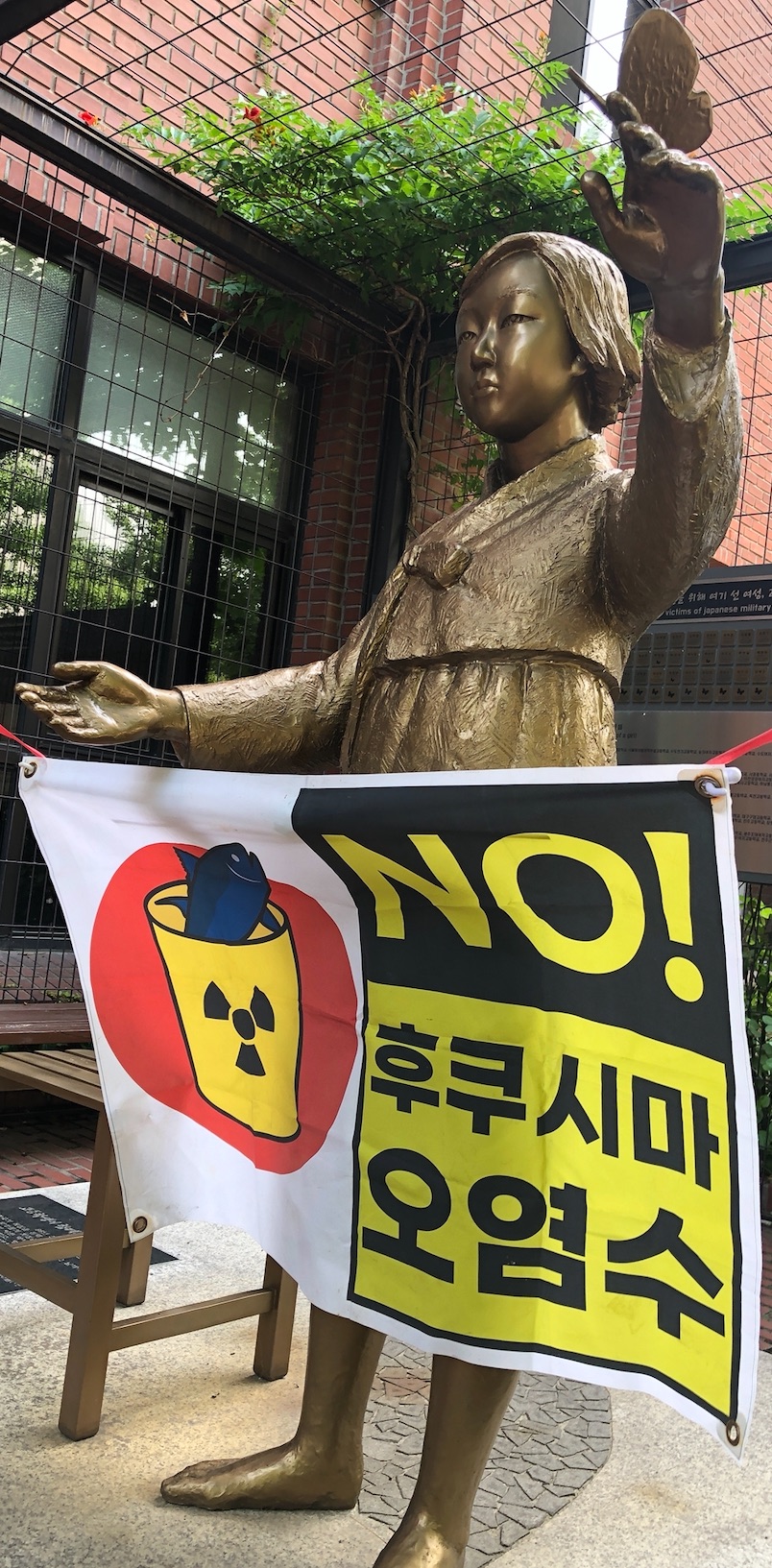[성명서] 태평양은 일본의 후쿠시마 핵폐수 처리장이 아니다
환경보건시민센터 보도자료 2024년 6월28일자
성/명/서
태평양은 일본의 핵폐수 처리장이 아니다
일본의 후쿠시마 핵폐수 해양투기를 규탄한다.
<사진, 2024년 6월27일 서울 중구 정동 프란치스코 교육회관 입구의 평화의소녀상 앞에
후쿠시마 핵폐수 해양투기반대 현수막이 걸려있다.>
일본정부와 도쿄전력이 2024년 6월28일 후쿠시마 제1원자력발전소 핵폐수의 7차 해양투기를 시작했다고 일본과 한국 언론이 보도했다. 보도에 따르면 7차 해양투기는 7월16일까지로 19일간 종전회차와 같은 량인 7,800톤이다.
일본정부와 도쿄전력은 2023년 8월24일부터 후쿠시마 핵폐수의 해양투기를 시작해 2023년도에 4회 방류했고, 2024년도 들어 6월4일까지 2회 방류하는 등 6회에 걸쳐 약 47,000톤을 해양투기했다.
일본정부와 도쿄전력은 이번 7차부터 1년간 7차례에 걸쳐 핵폐수 약 54,600톤을 태평양 바다로 해양투기할 계획이라고 한다.
<사진, 2024년 6월27일 서울 중구 정동 프란치스코 교육회관 입구의 평화의소녀상 앞에서 최예용 소장이 ‘한국국민은 후쿠시마 원전오염수 해양투기 반대한다’라고 쓰인 한글,일어,영문 펼침막을 들고 있다>
우리는 국제사회의 반대를 무릅쓰고 강행되는 일본의 후쿠시마 핵폐수 해양투기 행위를 강력히 규탄한다. 우리는 8월24일 후쿠시마 핵폐수 해양투기 1년 되는 시점에 전세계 시민사회가 참여하는 [후쿠시마 핵폐수 해양투기를 반대하는 5대양6대주 국제캠페인]을 추진한다. 이를 통해 바다를 접하고 있는 지구촌 모든 나라에서 일본의 핵폐수 해양투기 행위를 규탄하고 중단할 것을 요구하는 지구촌 압력을 조직할 예정이다.
후쿠시마 핵폐수의 해양투기가 계속되면 해양생태계의 방사능오염이 가시화할 우려가 매우 크다. 바다에서의 활동은 물론이고 식탁에 오르는 해산물의 안전이 크게 위협받는 것이다. 더불어 바다생태계가 방사능오염으로 어떤 위험을 겪을지 상상하기 어렵다. 그동안 인류는 바다에서 여러형태의 육상폐기물의 해양투기와 핵실험을 해왔지만 지구촌 시민사회의 여론으로 이를 저지시켰으며 런던협약 등의 국제해양협약을 통해 바다를 지켜왔다. 일본의 후쿠시마 핵폐수 해양투기도 지구촌 시민사회의 압력으로 반드시 중단시켜 인류공동의 미래인 바다를 지켜나갈 것이다.
2024년 6월 28일
환경보건시민센터 (Eco-Health)
환경운동연합 바다위원회 (Friends of the Earth Korea, Sea Committee)
아시아직업환경피해자권리네트워크 (ANROEV)
내용문의: 최예용 소장 010-3458-7488
press release dated June 28, 2024
S/T/A/T/E/M/E/N/T
The Pacific Ocean is not Japan's nuclear wastewater dump
We condemn Japan's ocean dumping of Fukushima nuclear wastewater.
<Photo, in front of the Girl of Peace Statue at the entrance to the Franciscan Education Center in Jeong-dong, Jung-gu, Seoul, on June 27, 2024.A banner opposing ocean dumping of Fukushima nuclear wastewater is hung.>
Japanese and Korean media reported that the Japanese government and Tokyo Electric Power Company began the seventh ocean dumping of nuclear wastewater from the Fukushima Daiichi Nuclear Power Plant on June 28, 2024. According to reports, the 7th ocean dumping is scheduled for 19 days until July 16th, with the same amount as the previous round, 7,800 tons.
The Japanese government and Tokyo Electric Power Company began dumping Fukushima nuclear wastewater into the ocean on August 24, 2023, discharging it four times in 2023, and discharging it twice until June 4 in 2024, discharging about 47,000 tons over six times. It was dumped in the ocean.
The Japanese government and Tokyo Electric Power Company are said to be planning to dump approximately 54,600 tons of nuclear wastewater into the Pacific Ocean seven times over the course of a year, starting this seventh time.
<Photo, June 27, 2024, in front of the Statue of the Girl of Peace at the entrance to the Franciscan Education Center in Jeong-dong, Jung-gu, Seoul, Director Choi Ye-yong is holding a banner in Korean, Japanese, and English that says, ‘The Korean people oppose ocean dumping of contaminated water from Fukushima nuclear power plant.’>
We strongly condemn Japan's ocean dumping of Fukushima nuclear wastewater, which is being carried out despite opposition from the international community. On August 24th, marking the one-year anniversary of the dumping of Fukushima nuclear wastewater, we are promoting an international campaign across the five oceans and six continents in which civil society around the world participates. Through this, we plan to organize global pressure to demand that all countries around the world that border the sea condemn Japan's ocean dumping of nuclear waste and demand that it stop.
If the ocean dumping of Fukushima nuclear wastewater continues, there is a great concern that radioactive contamination of the marine ecosystem will become visible. Not only activities at sea but also the safety of seafood on our tables is greatly threatened. In addition, it is difficult to imagine what kind of risk the marine ecosystem will face from radioactive contamination. In the meantime, mankind has been dumping various types of land-based waste and conducting nuclear tests in the sea, but this has been prevented by public opinion from global civil society, and the sea has been protected through international maritime conventions such as the London Convention. Japan's ocean dumping of Fukushima nuclear wastewater will be stopped through pressure from global civil society to protect the ocean, the common future of humanity.
June 28, 2024
Eco-Health (Asian Citizens Center for Environment and Health
Friends of the Earth Korea, Sea Committee /
ANROEV (Asian Network for the Rights of Occupational and Environmental Victims)
Content inquiry: Director Choi Ye-yong +82-(0)10-3458-7488




